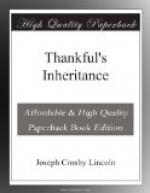“It’s kind of queer to me,” he went on, slowly, “to see the number of folks that make up their minds to be good—or what they call good—because they’re scared to be bad. Doin’ right because right is right, and lettin’ the Almighty credit ’em with that, because He’s generally supposed to know it’s right full well as they do—that ain’t enough for their kind. They have to keep hollerin’ out loud how good they are so He’ll hear and won’t make any mistake in bookin’ their own particular passage. Sort of takin’ out a religious insurance policy, you might say ’twas. . . . Humph!” he added, coming out of his reverie and looking doubtfully at his companion, “I—I hope I ain’t shocked you, ma’am. I don’t mean to be irreverent, you understand. I’ve thought consider’ble about such things and I have funny ideas maybe.”
Thankful declared that she was not shocked. She had heard but little of her driver’s long dissertation. She was thinking of her interview with Mr. Cobb and the probability of his accepting her proposal and taking a mortgage on her East Wellmouth property. If he refused, what should she do then? And if he accepted and she went on to carry her plan into execution, what would be the outcome? The responsibility was heavy. She would be risking all she had in the world. If she succeeded, well and good. If she failed she would be obliged to begin all over again, to try for another position as housekeeper, perhaps to “go out nursing” once more. She was growing older; soon she would be beyond middle life and entering upon the first stages of old age. And what a lonely old age hers was likely to be! Her husband was dead; her only near relative, brother Jedediah, was—well, he might be dead also, poor helpless, dreamy incompetent. He might have died in the Klondike, providing he ever reached that far-off country, which was unlikely. He would have been but an additional burden upon her had he lived and remained at home, but he would have been company for her at least. Emily was a comfort, but she had little hope of Emily’s being able to leave her school or the family which her salary as teacher helped to support. No, she must carry her project through alone, all alone.
She spoke but seldom and Captain Obed, noticing the change in her manner and possibly suspecting the cause, did his best to divert her thoughts and cheer her. He chatted continuously, like, as he declared afterwards, “a poll parrot with its bill greased.” He changed the topic from Mr. Cobb and his piety to the prospects of good fishing in the spring, from that to the failure of the previous fall’s cranberry crop, and from that again to Kenelm Parker and his sister Hannah. And, after a time, Thankful realized that he was telling a story.
CHAPTER VI
“Takin’ other folks’ advice about your own affairs,” began Cap’n Obed, “is like a feller readin’ patent medicine circulars to find somethin’ to cure a cold. Afore he gets through his symptoms have developed into bronchitis and pneumony, with gallopin’ consumption dead ahead. You never can tell what’ll happen.




